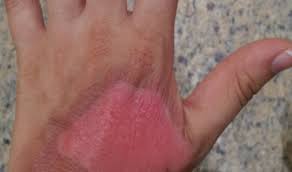scald
英 [skɔːld]
美 [skɔld]
- vt. 烫伤;烫洗;加热;晒焦
- vi. 烫伤;烫洗;煮沸
- n. 烫伤;烫洗
GRE
1. s- (ex- "out, off, thoroughly" => es- => s-) + cald- "hot" => scald.
2. => "bathe or wash in hot water".
3. => to be very hot; to afflict painfully with hot liquid or steam.
- scald
- scald: [13] Scald comes ultimately from Latin calidus ‘hot’ (source also of English cauldron and chowder and related to calorie and nonchalant). From it was derived the verb excaldāre ‘wash in hot water’, which passed into English via Anglo-Norman escalder as scald.
=> calorie, cauldron, chowder, nonchalant - scald (v.)
- c. 1200, "to be very hot; to afflict painfully with hot liquid or steam," from Old North French escalder "to scald, to scorch" (Old French eschalder "heat, boil up, bubble," Modern French échauder), from Late Latin excaldare "bathe in hot water" (source also of Spanish escaldar, Italian scaldare "heat with hot water"), from Latin ex- "off" (see ex-) + calidus "hot" (see calorie). Related: Scalded; scalding. The noun is c. 1600, from the verb.
- 1. Be careful not to scald yourself with the steam.
- 小心别让蒸汽把你烫着。
来自《权威词典》
- 2. Don't scald your hands when you open the steamer.
- 掀笼屉时小心热气嘘着手.
来自《现代汉英综合大词典》
- 3. Don't scald your lips in another man's porridge.
- 不要在别人的热粥上烫伤你的嘴唇.
来自《简明英汉词典》
- 4. Scald the dishes before drying them.
- 擦干碟子前先用热水烫一烫.
来自辞典例句
- 5. Conclusion The Burn - scald tincture of herb can inhibit the acute inflammation.
- 结论消炎烧烫酊对急性炎症有抑制作用.
来自互联网
[ scald 造句 ]
